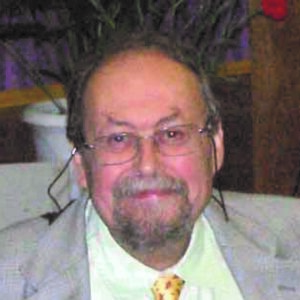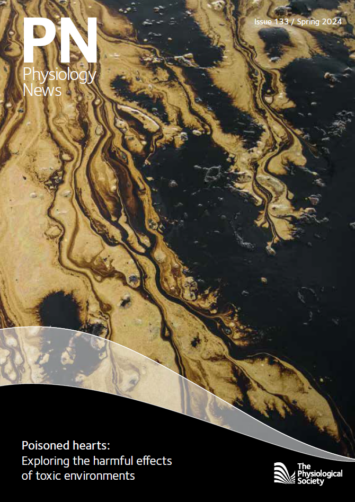
Physiology News Magazine
Obituary: Professor David Brown (1936-2023)
Membership
Obituary: Professor David Brown (1936-2023)
Membership
https://doi.org/10.36866/pn.133.46
Professor Mala Shah,
University College London, UK

Professor David Brown, FIBiol, FRS was renowned worldwide for discovering the ‘M-current’, a non-inactivating K+ current inhibited by muscarinic receptors (chemicals that modulate synaptic activity in the brain), in bullfrog sympathetic ganglion proteins in 1980 (Brown and Adam, 1980). Throughout his distinguished career, David was at the forefront of understanding the biophysical characteristics, function and regulation of the M-current and other ion channel currents in peripheral and central neurons, resulting in many seminal publications. As a fitting tribute to recognise his many contributions to the ion channel field, a one-day meeting on “Ion Channel Regulation and Neuronal Function” was held at the Royal Society in July 2013 (partly supported by The Physiological Society). It is, thus, with great sadness that he died last autumn, on 21 October 2023.
David obtained a first-class honours degree in Chemistry, Physiology and Zoology from University College London in 1956 followed by Special Physiology in 1957. He then gained a PhD in Pharmacology from St Barts Hospital Medical College. Following this, he became a lecturer at St Barts Hospital Medical College before taking up the position of senior lecturer at the School of Pharmacy in 1973. He went on to become the Wellcome Professor of Pharmacology at the School of Pharmacy (University of London; currently part of UCL) and to lead the Department of Pharmacology at the School of Pharmacy with distinction (1979 – 1987).
Through these early years and throughout his career, David recognised the value of international scientific collaborations. In fact, he obtained visiting professorships at the universities of Texas, Chicago, Iowa and Kanazawa and a Fogarty Scholar-in-residence at the National Institutes of Health (NIH). During these visits, he established numerous collaborations and connections, which he maintained for many years. These connections were invaluable in the many discoveries he made, including electrophysiological recordings of the M-current in bullfrog sympathetic neurons (Brown and Adam, 1980) and the first identification of receptor-ion channel transduction mechanisms in neurons involving phospholipase C (Higashida and Brown, 1986) (supported by Fogarty Scholar-in-residence, NIH).
In recognition of his numerous groundbreaking achievements in the field of ion channels and their regulation he was appointed a fellow of the Royal Society in 1990
He eloquently detailed his collaborations and adventures in research in an article published in Annual Reviews of Pharmacology and Toxicology (Brown, 2020). He encouraged colleagues to interact and collaborate with scientists at an international level. In recognition of his numerous groundbreaking achievements in the field of ion channels and their regulation he was appointed a Fellow of the Royal Society in 1990.
In 1987, he became Head of the Department of Pharmacology at UCL, holding the Astor Chair, a position he retained until his retirement in 2002. As Head of Department, he took a significant interest in helping colleagues, including PhD students and postdoctoral fellows, achieve their goals and aspirations. As a PhD student in his department, he encouraged me to apply for the Wellcome Trust International Prize Travel Research Fellowship. This enabled me to join Professor Daniel Johnston’s laboratory (Baylor College of Medicine, US) to learn pioneering advanced electrophysiological techniques. The techniques are required for gaining new insights into the physiological properties and function of hippocampal and cortical neurons. This was a pivotal and invaluable experience for me, which I attribute to David. Even after returning from US to start my independent research career in the UK, David was helpful in providing insightful career advice. He has provided similar guidance and support to many others at UCL and around the world.
Another key factor that David attributed to his success was his pursuit of reading peer-reviewed articles on research in other disciplines. When entering his office, I was always struck by the number of scientific journals stacked on a table near his desk and the volumes of books on the shelves, which he would spend time browsing and reading. As journals transitioned to online, he perused the online content on a regular basis and shared articles that he thought would be relevant and of interest to colleagues. This fountain of knowledge was particularly useful to him for innovative research ideas and writing review articles or books, such as the book From Neuron to Brain, which he was energetically editing up until a few days before his passing.
Another key factor that David attributed to his success was his pursuit of reading peer-reviewed articles on research in other disciplines. When entering his office, I was always struck by the number of scientific journals stacked on a table near his desk
In addition to his roles at UCL, David had numerous international appointments. David served as international secretary for The Physiological Society for three years, during which time he travelled to many countries promoting physiology. He was also chief editor for British Journal of Pharmacology and was a member of the editorial boards for Neuron, Trends in Neuroscience, The Journal of Physiology, European Journal of Neuroscience and Proceedings of the Royal Society (among others). He served on grant committees and advisory boards, including the Deutsche Forschungsgemeinschaft and Max Planck Society. He had a full, distinguished and illustrious career. Importantly, he enjoyed engaging with fellow scientists. For David, taking on all these roles was not an imposition but an honour.
Despite all his remarkable achievements, David was a humble, modest and respectful person who treated everyone equally and without prejudice. Evidence of his modesty is in an article in which he wrote “his own career was nothing unusual” in the context that three of his colleagues (Professor Humphrey Rang, Professor Tom Connors and Professor Christine Armett) who completed “Special Physiology” with him also had distinguished careers (Brown, 2020).
His personality together with his approachable attitude were, in my view, most important for his success as a world-renowned leader in science. I, as many other colleagues, will miss the insightful and witty conversations and e-mail exchanges we had with him.
References
Brown DA, Adam PR (1980). Muscarinic suppression of a novel voltage-sensitive K+ current in a vertebrate neurone. Nature 283, 673-6. https://doi.org/10.1038/283673a0
Brown DA (2020). Neurons, Receptors, and Channels. Annual Review of Pharmacology and Toxicology 60, 9-30. https://doi.org/10.1146/annurevpharmtox-010919-023755
Higashida H, Brown DA (1986). Two polyphosphatidylinositide metabolites control two K+currents in a neuronal cells. Nature 323, 335-5. https://doi.org/10.1038/323333a0
